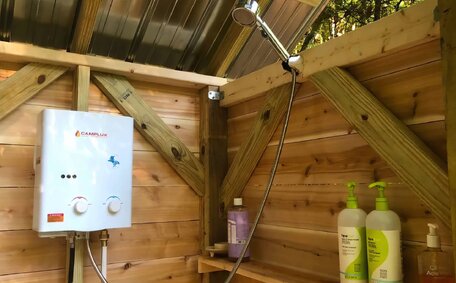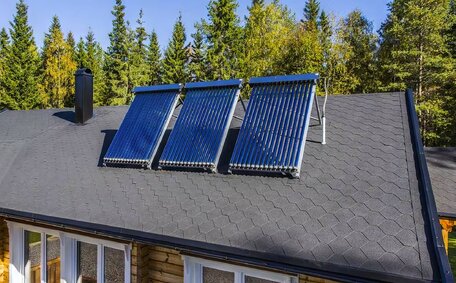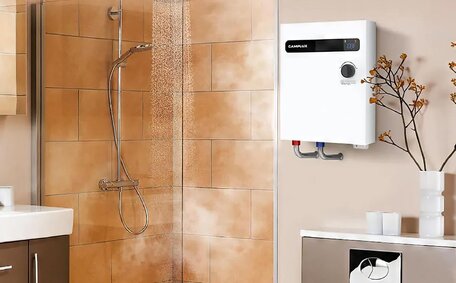Introduction to Energy-Efficient Hot Water Systems
Welcome to Cranebrook Plumbing, where our skilled team ensures your water needs are met with reliable, local service. In this article, we’ll explore the benefits of installing an energy-efficient hot water system in your home.
Energy-efficient systems, including heat pump water heaters, solar and gas hot water systems, offer significant energy and cost savings over traditional electric storage water heaters. Using an energy-efficient hot water system can significantly cut energy bills by using less electricity or gas. We will discuss various hot water heater types to help identify the most suitable option for your home.
Upgrading to an efficient electric hot water system allows you to trim down energy bills and your carbon footprint. Additionally, many energy-efficient models qualify for government rebates. Read on to learn how to choose the right hot water system for your home and maximise savings!
Understanding Heat Pump Technology and How It Saves Energy
Instead of directly heating water, heat pumps use a compressor and refrigeration system—like a reversed refrigerator—to absorb heat from the surrounding air into your water tank.
This innovative approach substantially reduces running costs, rendering heat pump hot water systems much more energy-efficient than traditional options.
A heat pump can generate up to 5 kW of heat energy for every 1 kW of electrical energy used, enhancing the efficiency of your hot water system. That’s an efficiency rating of over 500%, which, when compared traditional gas or electric storage units, is markedly superior. By switching to an efficient heat pump system, the average household can save up to 75% on water heating costs.
Instant gas hot water systems deliver heated water on demand, offering uninterrupted supply and stable temperatures. Heat pump systems maintain their efficiency consistently, even during colder months with less ambient heat.
Maintenance is also low. There are no electric heating elements to replace and heat pump systems are akin to instantaneous hot water units, having fewer moving parts. Heat pumps provide significant energy and cost savings alongside a reliable supply of hot water.
Types of Energy-Efficient Systems
There are several types of energy-efficient hot water systems to choose from:
Solar Hot Water Systems
Solar water heaters employ rooftop solar panels to heat water throughout the daylight hours. The heated water is secured in water storage solutions, specifically an insulated tank, for use when needed.
Solar hot water systems can cover up to 90% of your home’s hot water requirements, substantially lowering energy bills through solar energy use.
Heat Pump Systems
As explained previously, heat pump water systems use a small amount of electricity to absorb ambient heat and deliver hot water. Integrated heat pump systems incorporate the unit on top of the storage tank, improving the system’s overall cohesion. Split system heat pumps have the heat pump unit separate from the tank.
Gas Hot Water Systems
Gas hot water systems heat water quickly in a storage tank using gas burners, providing an efficient water heating solution. Modern 5-star gas hot water systems boast improved insulation, expansive storage hot tanks, and electronic ignition for enhanced efficiency. Although slightly less efficient than heat pumps or solar options, gas water heaters generally have lower installation and maintenance costs.
How Solar Hot Water Systems Harness Renewable Energy
Solar hot water systems are one of the most eco-friendly options, offering more than cost-effective renewable energy for domestic hot water heating. They use solar heat pump technology with collector panels on your roof to harness heat energy from sunlight.
The gas storage hot water system’s collectors consist of a network of tubes filled with water your household will eventually use. As sunlight hits the tubes, the water inside gets heated. This system captures sunlight, transferring solar water heat efficiently, which then streams into an insulated storage tank ready for use in your home.
With solar hot water primarily relying on the sun’s free energy, household water heating consumption can be reduced by 50-90%, depending on the system. This saves you money while avoiding several tonnes of greenhouse gas emissions over your hot water system’s lifetime.
During prolonged cloudy spells, a boosted solar hot water system with an instant gas booster ensures a sustained hot water supply. Modern systems equipped with large storage tanks can typically provide hot water for several days without the need for additional energy input.
Solar hot water works efficiently across Australia all year round. Positioning collector panels on north-facing sections of the roof can considerably reduce your energy bills, as it maximises the sustainable capture of solar radiation.
The Benefits of Efficient Hot Water Use
Adopting an energy-efficient hot water system can benefit your home in numerous significant ways.
Switching to an energy-efficient hot water system, such as electric gas, heat pumps, or solar, can lead to considerable savings on energy bills. Efficient systems, such as heat pumps and solar hot water, use less power to reduce your electricity or gas expenses by 50-75%. The savings add up over time, justifying the upfront costs with thousands of dollars saved in the long run.
You’ll also dramatically lower your carbon footprint from hot water heat production. Energy-efficient hot water systems contribute to fewer greenhouse gas emissions. Solar hot water prevents over a tonne of CO2 per year being released into the atmosphere.
An energy-efficient hot water upgrade allows utilising renewable solar power for water heating. Solar collectors harness the sun’s free energy, while gas lpg heat pumps extract latent heat around your home. This translates to greater energy sovereignty through the utilisation of natural techniques in hot water heaters.
Heat pumps supply a continuous flow of hot water without heating an entire tank, unlike traditional storage heaters. Heat pumps and instant gas heaters deliver hot water on demand.
Modern continuous flow hot water heaters, known for energy efficiency, are both cost-effective and simple to maintain. The significant long-term savings justify the initial investment. In the long term, your system could recoup its cost within 5 years.
Upgrading to a heat pump hot water system makes sense both environmentally and financially. You reduce bills while treading lighter on the planet - a sure fire win-win!
Reduced Energy Bills
Installing an energy-efficient hot water system can lead to substantially lower energy bills. An appropriately sized heat pump or solar hot water heaters can cut water heating costs by 50-75% for an average household. This adds up to hundreds or even thousands of dollars in savings per year.
Choosing the right-sized system, based on your daily hot water usage, is essential for maximising benefits. It also needs to be paired with adequate insulation and smart control settings to minimise standby heat loss.
Solar hot water harnesses renewable power, while heat pumps utilise ambient thermal energy for water heating instead of electricity or gas. This reduces your home’s total gas water energy demand.
When installed and operated correctly, modern energy-efficient hot water systems can save the average family over $500 per year on bills. And with energy prices becoming more expensive, investing in a new heat pump hot water system can lead to even more substantial long-term savings. Your new system could pay for itself in just a few years!
Lower Environmental Impact
Upgrading to an energy-efficient hot water system can save up dramatically on your environmental impact. Solar hot water systems can prevent the emission of over 1 tonne of carbon dioxide each year by using renewable solar energy, in comparison to standard electric water heaters.
A heat pump system can halve emissions compared to traditional gas or electric models by using ambient heat rather than directly burning fossil fuels, also reducing energy bills. This amounts to a significant reduction in greenhouse gases over the lifespan of your hot water system.
As eco-conscious plumbers, we’re committed to providing sustainable solutions that tread lighter on the planet. Solar panels and heat pumps utilise natural processes for water heating, reducing reliance on coal-fired power. Choosing a gas solar hybrid or an efficient heat pump system can greatly reduce your carbon footprint and aid in climate change efforts.
Besides benefiting the planet, a lower environmental impact from reduced fossil fuel use in your home also leads to financial savings and takes advantage of freely available solar energy. It’s undoubtedly a dual benefit for both your wallet and the environment!
Available Rebates and Incentives
There are great rebates and incentives available from the Australian government and energy providers to help make upgrading to an energy-efficient hot water system more affordable.
The main rebates currently on offer are through the VEU program, the Victorian Energy Upgrades programme, facilitated by an accredited provider. This provides generous discounts on installing heat pump or solar hot water systems. Rebates often exceed $1000 for efficient systems like heat pumps or solar hot water heaters.
There are also federal government rebates in place under the Small-Scale Renewable Energy Scheme (SRES). This covers items like solar water heaters and heat pump hot water systems. The amount varies based on your geographic zone, system type and configuration.
These rebates and incentives can also cover a significant portion of your upgrade expenses. We can help check, on your behalf, which rebates your household is eligible for, and assist with processing applications. This allows you to maximise savings and achieve a faster payback on your new energy-efficient hot water system.
Reach out to our team at Cranebrook Plumbing to find out more about current rebates and incentives that could make your hot water upgrade even more affordable!
Installation and Maintenance Considerations
Installing the right energy-efficient hot water system for your home is key to maximising performance and savings. Your plumber should assess factors such as your household’s daily usage and specific energy requirements, tailoring the installation to your needs, considering roof space for solar collectors, and physical location constraints to select the optimally sized system.
Especially for solar hot water, the orientation and tilt of the collector panels can impact the efficiency of water heating. North-facing roofs capture the most sunlight, offering optimal solar gains. Panels should be regularly cleaned to ensure they maintain clear exposure to sunlight.
Regular maintenance is essential, ensuring the longevity and efficiency of your hot water system, whether it’s natural gas or another type. Maintenance tasks include flushing heat pump filters, checking coolant levels in solar collectors, and testing valves and temperature/pressure sensors. It’s advised to service your system annually for the best performance.
Smart controls can fine-tune heat sources for optimal efficiency.
Thermostats should be set to the recommended level, approximately 50°C, for most homes. Timers are useful for aligning hot water production with peak usage times. Pipe insulation also effectively minimises standby heat loss.
Proper setup and regular servicing ensure your energy-efficient system operates effectively for many years. Contact Cranebrook Plumbing for expert advice on optimising your hot water efficiency.






